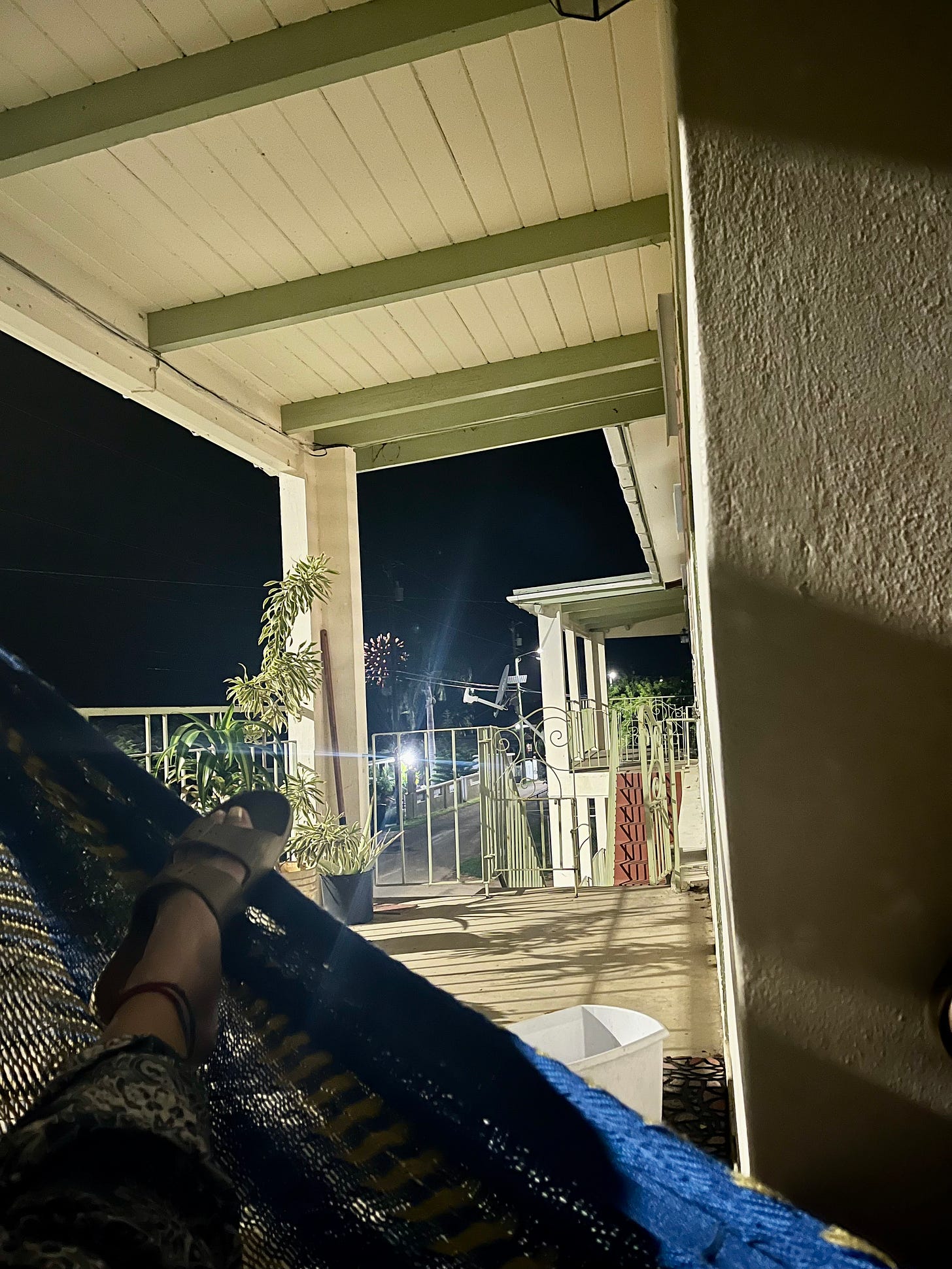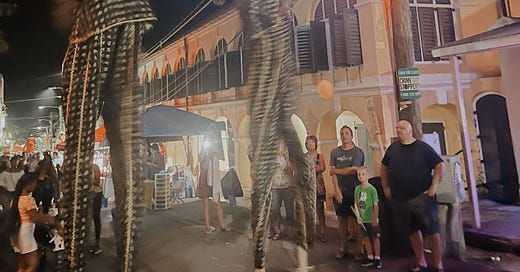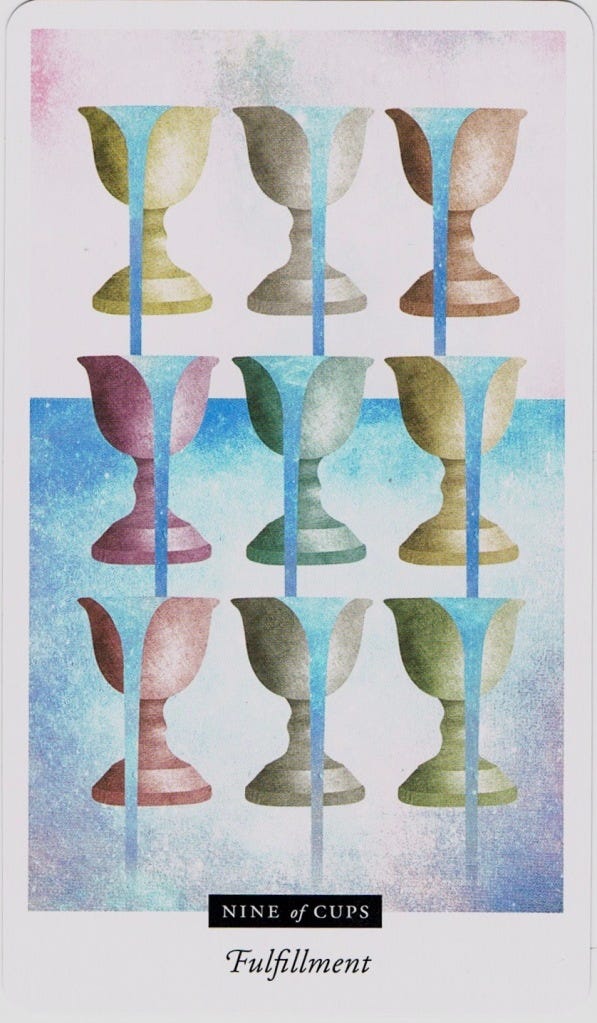we celebrate everything.
the owner of a laundromat reminds me that celebration isn't supposed to be rare.
I walked into the laundromat, dodging people hunching over open dryers and wire baskets spilling over with clothes, their damp sleeves and hems like lolling dog tongues on a hot day.
Over the symphonic hum of the machines, I caught snippets of conversations: holiday recaps, complaints about missing socks, and long-suffering sighs while watching the endless churn of fabric against metal.
A gentle breeze pushed through the open-air facility. As I looked to the back of the building, I could see the empty field just outside of the laundromat, where the tall grass swayed, creating a funny juxtaposition between the industrial rows of Speed Queen machines and the bucolic place just steps away.

Hilly was sitting on a bench on the border of these two worlds. He was silhouetted in sunlight, looking every bit like Rodin’s Thinker. His brow was wrinkled. He was staring intently at the laundry machine in front of him, almost as if he was trying to figure out how it all worked.
“It’s not working,” he said to me as I approached.
Indeed, the washing machine definitely was not washing. Our clothes spun aimlessly against a dry canister. No water rushed in. The orange arm of the old-school timer was stuck, refusing to advance the cycle forward.
Considering that we had fed the generously-sized Speed Queen $7.50 in quarters in exchange for some clean clothes, we decided it was necessary to ask for help. And help arrived, in the form of a middle-aged man and his 14-year-old son. He introduced himself as Anuar and began to methodically remove the front panel to the misfiring machine.
As he worked, Hilly began to talk to him, as he always does in moments like these. One of my favorite things about my partner is his ability to make conversation with anyone, about anything. Unsurprisingly, within minutes, we had learned that Anuar was from Palestine originally, had lived in St. Croix for over two decades, and had found everything from bra wires to a wrench lodged inside of his washing machines over the years.
As he examined the machine, he told us stories about once owning the only gas station on the island with an eye wash machine, due to a health inspector with a long-held grudge. He told us about his family—besides his son, he had two daughters and a wife, who he pointed out to us across the room.
Eventually, the conversation turned to the island itself, a pattern I have noticed in my short time living here. People love to talk about St. Croix.
“How long are you visiting for?” Anuar asked. Hilly explained that we actually lived here.
“Do you love it?” Anuar asked, chuckling as if he already knew the answer. Hilly said that he did. Anuar smiled knowingly, as a shared understanding passed between the two of them.
“It’s a special place. I visited my cousins in Jersey a few months ago. And you know what? I couldn’t wait to get back home. Life is different here. We live in the moment.”
“You know what’s funny?” he continued. “My cousin, he is always stressed. Thinking about work. Can you believe that he plans for days that are two weeks away?!”
I laughed and nodded, knowing full well that I was all too much like his cousin. Just that morning, I had stressed about having enough vacation days to take all of the trips I want: to Belize, back home, to Thailand. Anuar continued as he pried the front off of the Speed Queen, exposing her dusty guts for all the world to see.
“My laundromat got broken into a few weekends ago, and you know what I did? I closed up for a few days and didn’t worry about it. I went to a wedding in Chicago. I said, ‘I’ll deal with it later.’ And I did.”
“It was fine. There’s so much to worry about in life. But here? We don’t worry so much. Instead, we celebrate EVERYTHING. Even when there’s nothing to celebrate.”
Anuar adjusted a few more screws, and just like that, water began to rush into the barrel, soaking our clothes and moving the cycle forward. I clapped my hands together softly and released a tiny hurrah from my lips. It disappeared quickly, absorbed into the piles of fabric that surrounded me.
I thought back to the night before, when I had stretched out in the hammock strung over our porch and watched an impromptu, unexpected fireworks show dot the horizon. I had asked around, curious as to the reason behind such an intentional display, but no one knew why the fireworks had been launched.
I guess the point was that there didn’t need to be a reason.

That afternoon, as Anuar packed up his tools and shook Hilly’s hand, ending with the now-familiar fist against the chest gesture passed between Crucians, I thought about what it would mean to live a life where everything was celebrated.
Even if there wasn’t really a reason to celebrate.
When I think of the word ‘celebration,’ my mind fills up with memories of birthday parties and blurry New Years Eve parties. I associate the verb “to celebrate” with scarcity—the gatherings are few, and most are annual.
When I was a kid, along with my siblings, I cut out strips of construction paper and looped them together into a long, red-and-green chain with enough links to count down the days until Christmas. We’d tear one off each day, moving the needle one tick closer to the moment designated for celebration.
I remember a sickeningly sweet feeling of anticipation in my stomach as the number of loops lessened. It was almost painful to wait.
I suppose that I have lived my life like this. Unlooping one paper link after another, patiently awaiting some cosmic permission to cut loose, unwrap gifts, and eat way too much food. I have lived believing that what is termed special loses its shine if I take too big of a portion—if I choose to celebrate everything, perhaps life will lose its luster.
If I celebrate everything, perhaps that paper chain will catch fire and incinerate every shred of meaning in the process.
After all, I have lived with that chain of restraint tightly wound around my neck, forcing me to reserve the sort of full-bodied celebration I long to release for moments with time limits on them.
Living this way has left me with a post-celebratory hangover, the kind that isn’t brought on by alcohol or too little sleep. When the gifts are unwrapped and that final loop is torn apart, I struggle to return to the austere, mundane life that is devoid of the sparkle and shine of celebration.
I believe that the party cannot last forever. And I find it hard to wait so long to feel it again.
On the day after Thanksgiving, I drove east with Hilly to wander around the streets of Christiansted during a local festival called Jump Up. As with the random fireworks, I asked those who had lived on the island for much longer than me to explain the origins of Jump Up.
No one really knew. It’s a celebration, they told me. Don’t overthink it.
I tried not to ask a lot of questions that night as I stood in front of a steel drum band preparing to play. People formed a half circle around them, phones raised in the air with thumbs poised to press record.
Those first bright notes were like fireworks, exploding in my ears with the full spectrum of colors. I marveled at how easy it was to stand there and absorb all of the sensations of the moment: the rhythm of the drums, the sway of the crowd, the brush of shoulders against mine as other people moved past me.
Later, the moko jumbies appeared.
These tall stilt walkers were dressed in traditional garb that shone against the night sky as they danced and flirted with the crowd. According to tradition, these funny figures are actually fierce protectors—their extreme height allowed them to see over the west African villages they originated from and to warn the community of any approaching threats, be they physical or spiritual.
The moko jumbies slowly made their way down the streets. I followed them, entranced by their magic.
I wondered what it felt like to be a moko jumbie.
To see the celebration roaring at their feet—the long lines of folks waiting for roti and shaved ice, the local artisans spreading their handmade jewelry out on tables—and to also be able to see the perimeter of the celebration and understand the shape it made as the crowds shifted and grew and, eventually, receded as the night wore on.
But later that night, as the streets cleared, the last pates were sold, and the vendors packed up their wares, I didn’t feel that sense of sadness that so often colonizes me in the moments after the celebration is over. Strangely, it was almost as if the celebration had no shape at all.
There was no clearly defined beginning or ending or purpose to this joy that I could see…and because of that, it was easy to let the magic follow me home and linger around me like smoke after a particularly spectacular fireworks finale.
As I write this, I’m not sure that feeling has worn off or blown away.
I returned to work today, but the transition didn’t feel nearly so heavy—the undone paper chain wasn’t staring at me from the trash, so to speak. It had never existed at all.
As Anuar said, Crucians need no excuse to celebrate (just take a look at the list of public holidays—there are more than two dozen). Maybe there’s no need to search for an excuse or reason to celebrate life, something that feels more deserving than just…living.
I think the moko jumbies that prowled the streets during Jump Up were protecting celebration.
They stood, watching vigilantly, and cast a protective perimeter around the entire island, sealing it against the tired narrative that celebrations are to be rationed and saved for certain days on the calendar.
Because, as I am learning from costumed figures on stilts and kind laundromat owners, celebration begets celebration. When you celebrate everything, life becomes one endless opportunity to find joy.
It felt appropriate to write about celebration this week, seeing as we’re about to head into December, which is traditionally packed full of celebratory moments. I’m curious about how you make time for everyday celebration, inside and outside of the holiday season. Do you believe that celebrations lose their magic when we have many of them? I’d love to hear your thoughts.
Cards for Humanity: The Nine of Cups
When I was a kid, I was fascinated by the idea of a champagne waterfall. You know what I’m talking about, right? Some really rich and fancy person claps their hands, and a fleet of waitstaff decked out in black tie attire set up a pyramid of delicately fluted champagne glasses.
Once the precarious structure is in place, copious bottles of bubbly (probably not the cheap ass André I’m accustomed to buying for my mimosas) are popped and poured into the topmost glass. It overflows, eventually spilling the champagne down to the next tier. And so on and so forth until you have a very pretty but not very functional centerpiece for your next cocktail hour.
I always think of a champagne waterfall when I think of the Nine of Cups. Truthfully, I don’t love the Smith Rider Waite illustration1 that accompanies this card, mostly because it feels pretty static for a card that, to me, is full of motion and movement.
I like the interpretation that is given by the Field Tarot, which showcases cups that are spilling over with bounty and able to pour into the cups of others. Like the iconic waterfall, in the energy of the Nine of Cups, we’re not too worried about spilling or wasting the precious liquid. We trust that there’s more where that came from.
This card is about fulfillment, abundance and giving without worrying about the return. It feels appropriate for the holiday season, as this is a time to celebrate with abandon and to not limit ourselves emotionally with what we can share with other. Often termed “the wish card,” the Nine of Cups is a sign that we are finally reaping what we have sown long ago in our relationships and in our approach to life. We feel called to celebrate—and not just one time before we call it quits. It’s time to enter into a lifestyle of joy, love and acknowledgement of the everyday celebratory energy of life itself.
When the Nine of Cups appears in a reading, it’s time to sit back and to appreciate the bountiful beauty of life. It’s time to be generous, with yourself and others, especially in the area of your emotions and expressing them to their fullest extent. Let it all pour out of you and see how, when you let it flow, the universe tends to open up another bottle, so to speak.
I hope you find many, many reasons to celebrate this week.
A lot of people say the figure in the SRW Nine of Cups looks like John Travolta. They’re not wrong.








Katie, I love this so much: the idea that a celebration can be an everyday thing, something without logic, without rationale. We need more of that in the apocalypse. I read a recent newsletter by Caroline Donofrio that references a Kurt Vonnegut quote: "And how should we behave during this Apocalypse? We should be unusually kind to one another, certainly. But we should also stop being so serious. Jokes help a lot. And get a dog, if you don't already have one." I think this is related to what you have written. To invite in more lightness, more celebration, even when it feels like there's no real reason to. ✨